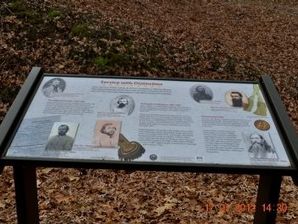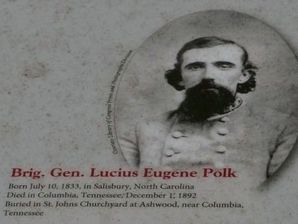Service with Distinction
Seven men from Phillips County, all of them immigrants to Arkansas, became high ranking Confederate officers. They served with honor in the Army of the Tennessee and in the Trans-Mississippi, participating in many decisive battles and campaigns.
The Arkansas Frontier, 1835-1861
Many ambitious men came to Phillip County before the Civil War, drawn by the opportunities offered by the frontier. Among them were lawyers Charles Adams and James Tappan; Patrick Cleburne, an Irish immigrant; Archibald Dobbins, a farmer; and Daniel Govan, Thomas Hindman and Lucius Polk - men of means. All enlisted in the Confederate army soon after the war began.
Serving the Confederacy,1861-1965
James Tappan saw combat first, leading the 13th Arkansas at Belmont, Missouri, in November 1861. Hindman, Cleburne, Govan, Tappan and Polk fought at the Battle of Shiloh in April 1862.
Tappan and Hindman returned to Arkansas but the other fought with the Army of Tennessee at Richmond, Perryville, Stones River, Chattanooga and Missionary Ridge. Hindman rejoined them at Chickamauga and they fought together until he was wounded at Kennesaw Mountain. The rest served together until Cleburne's death at Franklin, Tennessee, in November 1864.
Hindman became commander of the military district of the Trans-Mississippi. Adams and Dobbins fought with him at Prairie Grove in December 1862. Adams later commanded the Northern Sub-District of Arkansas. Dobbins led his cavalry regiment at the Battle of Helena on July 4, 1863, and commanded a brigade at the Battle of Big Creek in Phillips County in 1864.
Tappan fought in the Red River Campaign at Jenkin's Ferry.
Returning from the War
After the war Thomas Hindman went to Mexico. He was assassinated soon after returning to Helena. Archibald Dobbins fled to Brazil, where he disappeared. Lucius Polk, his health ruined, retired to his family's home in Tennessee.
Charles Adams, Daniel Govan and James Tappan returned to Phillips County. Adams moved to Memphis, practicing law until his death from yellow fever. Govan remained in Helena until 1894, when he accepted a post as an Indian agent in Washington State.
James Tappan remained in Helena, serving in the state legislature and twice declining the Democratic nomination for governor.










